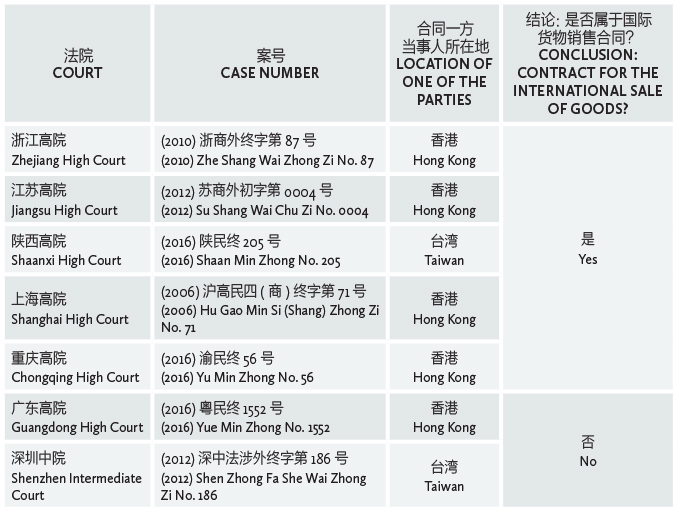In judicial practice, determinations have been inconsistent regarding whether a contract for the sale and purchase (S/P) of goods involving a Hong Kong, Macau or Taiwan enterprise (a sales contract) as one of the parties constitutes a contract for the international S/P of goods. If a sales contract is deemed a contract for the international S/P of goods (a ISP contract), then, pursuant to Article 129 of the Contract Law, the provision specifying a special four-year limitation of actions is applicable; otherwise the provision specifying an ordinary two-year limitation of actions applies (but it has become three years since the entry into effect of the General Provisions of the Civil Code on 1 October 2017). Where there is more than one court with jurisdiction over a sales contract dispute, and the two-year limitation of actions has expired but the four-year one is still in effect, the issue of selecting the venue most favourable to one’s side to conduct the procedure is of utmost importance.

BLAKE YANG
胡光律师事务所资深律师
Senior Associate
Martin Hu & Partners
We have collated the judgments of courts around the country, mainly high courts (see the table in this article). Among them, the Zhejiang High Court held that, pursuant to Articles 1 and 19 of the Interpretations of the Supreme People’s Court of Several Issues Concerning the Application of the PRC Law on the Application of Laws to Foreign-Related Civil Relationships (1), for the issue of the application of the law to civil relationships engendered by Hong Kong-related contracts, trials should refer to the foreign-related civil relationship, so it would not be inappropriate to apply the four-year limitation of actions to Hong Kong-related contracts in accordance with Article 129 of the Contract Law. The judgments of the Jiangsu, Shaanxi, Shanghai and Chongqing high courts directly found that the contracts in question were contracts for the international S/P of goods, but did not provide detailed reasoning. One should note that apart from one of the parties being a Hong Kong or Taiwan enterprise, there were no obvious foreign elements in those cases that were sufficient to determine the nature of the contract in question as “being a contract for the international sale of goods”.
In contrast, both the Guangdong High Court and the Shenzhen Intermediate Court found that the contracts in question were not contracts for the international S/P of goods, by proactively applying the United Nations Convention on Contracts for the International Sale of Goods (CISG). They held that pursuant to the CISG, the precondition for application of an ISP contract is that the contract for the sale of goods be concluded between parties whose places of business are in different countries, and “‘different countries’ means not falling under the sovereignty of one country, so a S/P contract concluded between parties whose places of business fall within the sovereignty of the same country is not an ISP Contract…” Since Hong Kong and Taiwan are parts of China, the contracts in question were not contracts for the international S/P of goods.

CHANCY CHEN
胡光律师事务所律师
Associate
Martin Hu & Partners
胡光律师事务所
One party argued that the trial procedure for a foreign-related case applies mutatis mutandis to a Hong Kong-related case, so the four-year limitation of actions for an ISP contract should also apply mutatis mutandis to a Hong Kong-related contract. However, the Guangdong High Court held that the trial procedure applied in a case had no effect on the nature of the contract and should not serve as a criterion for identifying the nature of the contract. Accordingly, the argument that a Hong Kong-related S/P contract is an ISP Contract and the four-year limitation of actions should apply was without factual or legal basis.
In short, the essence of the issue of whether the four-year limitation of actions applies to a sales contract comes down to whether it is an ISP contract as specified in Article 129 of the Contract Law. With the exception of the definition of a “contract for the international sale of goods” provided in the CISG, current Chinese laws and regulations do not provide a specific interpretation or definition of this concept. Pursuant to the “precedence of treaties” provision of Article 142 of the General Principles of the Civil Code, the definition of “contract for the international sale of goods” in the CISG should be directly applied. Accordingly, a sales contract may not directly be equated to an ISP contract. Based on the thinking in the CISG, the parties to a sales contract “are not parties whose places of business are in different countries”. Therefore, such contracts are not “contracts for the international S/P of goods”. However, if an enterprise registered in Hong Kong, Macau or Taiwan has a “place of business” in another CISG member country and the relationship between this “place of business” and the performance of the contract is the closest, such contracts could be found to be an ISP Contract pursuant to Article 10 of CISG.
The Supreme People’s Court does not seem to have provided any clear guidance on this issue. For example, the Jiangsu High Court case in the table was appealed to the Supreme People’s Court. Because both the two-year and four-year limitation of actions had expired in the case, the Supreme People’s Court, at appeal, avoided rendering a finding on this issue or providing reasons on whether a sales contract is an ISP contract.
In one case involving an application for the enforcement of a foreign-related arbitration award, the Second Intermediate People’s Court of Tianjin petitioned the Supreme People’s Court for an opinion. The Tianjin court held that the Hong Kong-related contract dispute in the case was a dispute over an ISP contract, but, in its reply, the Supreme People’s Court did not address whether such a description was appropriate, similarly avoiding a finding on the nature of a Hong Kong-related contract.
Blake Yang is a senior associate and Chancy Chen is an associate at Martin Hu & Partners
上海市芳甸路1155号浦东嘉里城办公楼8楼
邮编: 201204
8/F, Kerry Parkside Office, 1155 Fangdian Road
Pudong New Area, Shanghai 201204, China
电话 Tel: +86 21 5010 1666
传真 Fax: +86 21 5010 1222
电子信箱 E-mail:
blake.yang@mhplawyer.com
chancy.chen@mhplawyer.com






















